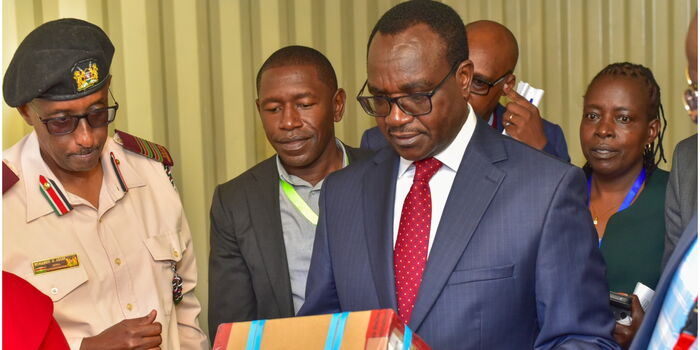The country has witnessed major changes in different sectors in the year 2024 as President William Ruto’s tenure enters its third year.
One sector that was not left behind during these changes is the Education sector. Kenyan students from Kindergarten to primary, secondary, and the university have felt the impact of Ruto’s leadership.
In this article, we look at the major educational changes that have taken place in 2024, their impact on the sector, and what to expect in 2025.
CBC Enhancements
The Competency-Based Curriculum continues to evolve as it sinks into the education system and for 2024, it was no different.
Grade 3 pupils from Kiangungi Primary School in Embu County during a CBC assignment
Photo
MARTIN FUNDI
The CBC was refined to reduce the number of learning areas and lessons, easing the burden on learners. Junior Secondary (Grade 7 to Grade 9) now has nine compulsory learning areas instead of the previous 14.
The learning areas have been categorised into three: Group One consists of English and focuses on language proficiency, reading comprehension, and communication skills.
Kiswahili/KSL (Kenyan Sign Language): Learners study Kiswahili or Kenyan Sign Language while the Religious Education section explores religious principles, ethics, and values. Social Studies/Life Skills Education: Covers history, geography, and life skills education.
Group Two consists of science, technology, and innovation: Mathematics, Integrated Science/Health Education, Agriculture/Nutrition/Home Science.
Group Three consists of Engineering and Applied Sciences which are Pre-Technical Studies/Business Studies/Computer Studies, Creative Arts (Visual and Performing Arts), and Sports.
These learning areas aim to provide a holistic and comprehensive education, equipping learners with a diverse range of skills and knowledge
Grade 9
2024 was an instrumental year for the education sector as it prepared for its first senior secondary school under the CBC. In preparation for the transition from grade eight to nine, the Ministry of Education had to make changes to facilitate the transition.
The Kenya National Examination Council (KNEC) will start administering questionnaires to Grade 9 students to explore their interests and personal attributes. This aims to help students choose their future paths more effectively.
Moreover, the Ministry of Education has overseen the construction of classes and distribution of books as the country awaits to see this transition and how it will unfold.
Although faced with many challenges, the government is optimistic that the CBC will sail through and eventually sink into the system.
Funding Model
Introduced in 2023, the government hoped to address financial challenges in public universities and Technical and Vocational Education (TVET) institutions with the Funding Model.
However, in 2024, the scheme received a lot of rejection that saw it being termed unconstitutional by the High Court.
This model categorises students into bands based on their household income and financial needs. The bands determine the level of scholarships and loans each student receives.
The Mean Testing Instrument (MTI) assesses students’ financial needs based on household income, geographic location, poverty levels, and other socioeconomic indicators.
Scholarships ranged from 30 per cent to 70 per cent based on the level of need, with the remaining costs covered by loans and household contributions.
Although the intention was noble, many students from vulnerable houses were categorized in bands where they could not afford their studies.
Following the controversies and rejections, a petition was filed against it and the High Court declared the new funding model unconstitutional in December 2024, citing discrimination and lack of public participation.
What 2025 looks like for the education sector;
2025 looks promising for the education sector with a lot looking to change. A smooth transition for Grade 9 students, is expected with all necessary infrastructure and resources in place. Students are also expected to receive quality and enhanced education with the reduction of learning areas giving teachers space to focus on skills and competency.
Although declared unconstitutional, the government is working on revising the model to comply with constitutional requirements.
President William Ruto at State House in Nairobi, during a past event on September 6, 2024.
PCS


